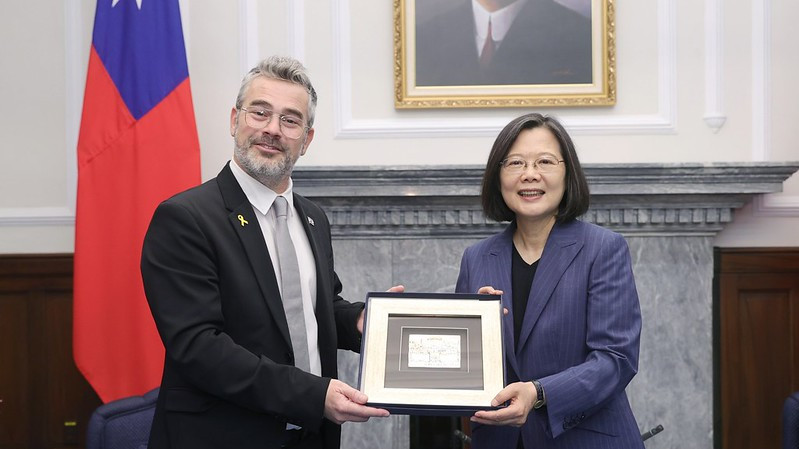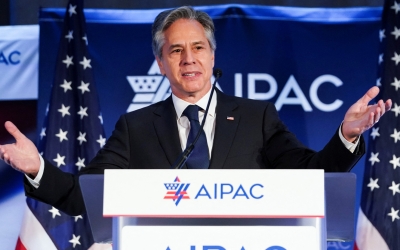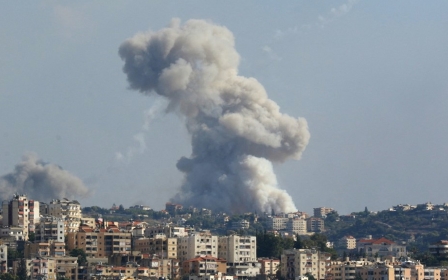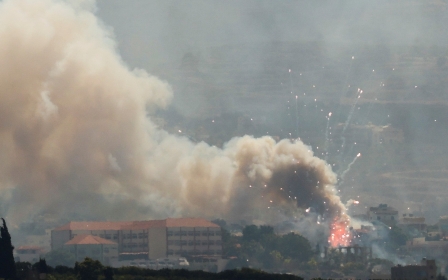Israel-Lebanon war: Why are Israel and Taiwan close allies?

A Taiwanese pager company was identified last week in connection to Israel's terrorist attack on Lebanon, in which booby-trapped pagers were detonated, killing at least 32 people and injuring thousands more.
The possible role of Taiwan in these deadly explosions is only the latest in a long history of military relations and collaboration between the two settler-colonial states, which goes back for at least half a century.
In the 1970s, when Israel, apartheid South Africa, and Taiwan were dubbed "pariah states", their alliance and cooperation in weapons trade was a major focus of their friendship.
The Kuomintang (KMT) regime in Taiwan, and before that in China, had been friendly to Zionism since World War One and supported the Balfour Declaration.
Israeli-Taiwanese relations warmed considerably after Israel launched its genocidal war against the Palestinian people in Gaza last October.
New MEE newsletter: Jerusalem Dispatch
Sign up to get the latest insights and analysis on Israel-Palestine, alongside Turkey Unpacked and other MEE newsletters
Taiwan rushed to condemn the Palestinian operation of 7 October and donated more than half a million dollars to fund services to Israeli soldiers and their families.
The subsequent genocide did not alter Taiwan's stance, as expressed by its foreign minister, Joseph Wu, in a March meeting with Israeli academics in Taipei: "We condemn the Hamas terrorist attack and stand in solidarity with Israel. Our position hasn't changed."
The Taiwanese Ministry of Foreign Affairs supported the visit.
After Iran's 13 April retaliation against Israel for the latter's attacks on its consulate in Damascus, Taiwan quickly moved to condemn Iran.
Two days later, Taiwanese President Tsai Ing-wen met with a delegation of Israeli Knesset members led by Boaz Toporovsky, the head of the Israel-Taiwan interparliamentary friendship group, and expressed her country's solidarity with Israel.
During the meeting, Tsai conveyed heartfelt condolences and solidarity to the delegation. Toporovsky affirmed that "During these horrible times, Israel saw and will always remember Taiwan's support."
Bases of imperialism
The Taiwan-Israel relationship has an interesting history, which is not limited to just an anti-communist Cold War alliance but is mainly premised on their diplomatic and political isolation in much of the world.
'Imperialism is afraid of China and of the Arabs. Israel and Formosa [Taiwan] are bases of imperialism in Asia'
- Mao Zedong, 1965
It was Mao Zedong who first recognised the nature of both regimes in 1965.
On the occasion of receiving a delegation from the Palestine Liberation Organisation, Mao declared: "Imperialism is afraid of China and of the Arabs. Israel and Formosa [Taiwan] are bases of imperialism in Asia. You are the gate of the great continent, and we are the rear. They created Israel for you, and Formosa for us. Their goal is the same."
The island of Formosa - the Portuguese named Taiwan in the 16th century - became important after 1947 and even more so after 1949.
The Chinese revolution gained ground and ultimately defeated the nationalist, right-wing Kuomintang party led by Chiang Kai Shek. The KMT leadership and more than a million and a half of its followers moved to Taiwan, which had a population of over six million people at the time.
The KMT took over the island, declared martial law for the next three decades, and continued to rule it as their private fiefdom until 2000. They bestowed the name "Republic of China" (ROC) on Taiwan, as the only territory they had control over when all of China was proclaimed the People's Republic (PRC) in October 1949.
While it abstained on the 1947 UN Partition resolution of Palestine, the KMT government officially recognised Israel in March 1949, a few months before it was overthrown. It also voted in favour of Israel's UN membership and even allowed Israel to establish a consulate in Shanghai.
Due to US hegemony and Cold War imperialist control of global institutions, western powers insisted that Taiwan remain the only recognised legitimate government of all of China and, therefore, continued to occupy the UN seat that China held since 1945, including in the Security Council, where China was the only non-European member that had veto power.
Aided by the US-based China lobby, the unelected KMT colonists of Taiwan held on to the UN seat until 1971, the eve of the normalisation of US-China relations in 1972.
Indeed, from 1965 to 1971, Israel, like the US, continuously voted against the proposed expulsion of Taiwan and its replacement by the PRC at the UN. It was not until 1979 that the US finally recognised the PRC.
China lobby
The China lobby was funded by Chiang's brother-in-law, the wealthy businessman TV Soong.
It was founded in 1952 by the American anti-communist activist Marvin Liebman, who established the organisation Aide Chinese Refugee Intellectuals (ACRI), which became the vehicle for him to launch campaigns in support of the Taiwan settler-colonial regime.
Follow Middle East Eye's live coverage of the Israel-Palestine war
Liebman was a Jewish, right-wing Zionist fanatic who worked with Irgun Zvai Leumi, the Zionist terrorist group that committed the massacre of Deir Yassin, killing hundreds of Palestinians, in April 1948. (He later converted to Catholicism and was baptised in 1978 at the age of 55.)
He became an international anti-communist cold warrior, serving as secretary to the Committee of One Million Against the Admission of Red China to the United Nations, which he founded in 1953, until 1969.
Liebman also became a lobbyist in 1965 for the Rhodesian racist settler-colonial regime of Ian Smith and went on to establish the Friends of Rhodesian Independence lobby group in 1966.
For his Taiwan advocacy, Liebman enlisted the help of then-Republican Congressman Walter Judd, who had been a Protestant missionary in China in the 1930s in support of the so-called "Republic of China".
Just as evangelical Christians had always been Zionism's biggest supporters in the West, they were also ardent supporters of the Taiwanese regime, especially as Chiang had converted to Protestantism in 1927.
ACRI received funding from the Ford Foundation, the Rockefeller Foundation, and later the State Department and the CIA.
The pro-Israel lobby, which would gain immense strength in the 1970s, saw the China lobby as an excellent precedent and model to follow.
Military cooperation
Even though Taiwan was a close friend of all conservative anti-communist Arab regimes, especially Saudi Arabia and Jordan, in 1975, Israel secretly transferred US missile technology to Taiwan and began to sell it Israeli missiles to the tune of half a billion dollars.
Indeed, the Israeli defence ministry established a permanent station in Taipei to facilitate military cooperation. Weapons cooperation and sales included artillery guns, mortars, missile boats, rifles, and submachine guns.
Israel has also reportedly transferred to Taiwan both nuclear and chemical warfare technology, in addition to intelligence training. Much of this trade was conducted at the behest of the US, for which Israel acts as a proxy.
These arms transfers would continue until at least 1992, when the PRC established diplomatic relations with Israel. That very same year, Israel established cultural and trade liaison offices in Taipei, which increased non-military trade relations.
While collaboration in the weapons industry continued between the two countries, it was Taiwan's leasing of an Israeli spy satellite system - Earth Remote Observation System-A - in 2001 that helped expand its espionage and monitoring of China. In 2022 alone, Israeli-Taiwanese trade amounted to more than $2.67bn.
The Israeli defence ministry established a permanent station in Taipei to facilitate military cooperation
Both Israel and Taiwan are front-line states against US-declared enemies - the Arab resistance to US imperialism and Zionist settler-colonialism, and China - and are both charged with destabilising their regions and igniting possible regional wars to weaken US adversaries.
That US Navy fleets and arsenals have been shuttling between the two pariah states over the last year is only the visible tip of the iceberg of ongoing US schemes to threaten its adversaries.
In this sense, both Israel and Taiwan can be compared to Ukraine, which the US has sought to transform into a Nato-backed battering ram against Russia - which Washington views as a formidable challenge to its imperial hegemony - at the cost of hundreds of thousands of Ukrainian lives.
In April, the US Senate overwhelmingly approved President Joe Biden’s $95bn foreign aid request to arm Ukraine, Israel and Taiwan.
Despite official denial, that the US seems to have been informed of the Israeli terrorist operation of exploding the pagers in Lebanon is hardly surprising, nor is the possible involvement of Taiwan in that barbarous operation, despite its own ongoing official denials of involvement.
The views expressed in this article belong to the author and do not necessarily reflect the editorial policy of Middle East Eye.
Middle East Eye delivers independent and unrivalled coverage and analysis of the Middle East, North Africa and beyond. To learn more about republishing this content and the associated fees, please fill out this form. More about MEE can be found here.







